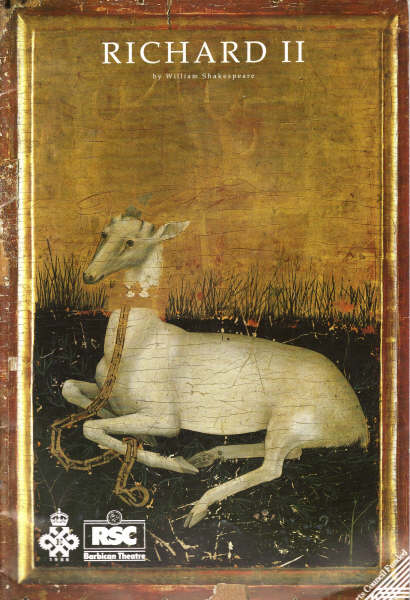I thought you had been willing to resign.
KING RICHARD:
My crown I am, but still my griefs are mine.
You may my glories and my state depose,
But not my griefs; still am I king of those.
Richard II is a shitty king. The play opens with him botching the adjudication of a dispute between his courtiers Bolingbroke and Mowbray, who want to fight each other. He exiles them both, overplaying his hand and driving Bolingbroke to open treason against his rule. Bolingbroke invades while Richard is away fighting a war in Ireland, and when he finally returns he finds that basically all of his friends and supporters have abandoned him, and he has no choice but to concede the crown.
Does Richard deserve it? As always, Shakespeare is cagey about politics. It is difficult to tell whether we are meant to respect Richard's appeals to the divine right of kings, an ideal made mostly unusable by the messiness and ambiguity of the rules of succession. Richard appeals to God again and again in his complaints, but Shakespeare is as irreligious as he is apolitical. Yes, Richard is a bad king, but is that enough? What is certain is that, set against bland politicians like Bolingbroke, he is a far more sympathetic and interesting person than anyone else in the play.
On the other hand, he really only becomes interesting once he's been deposed. When he surmises what has happened to him, he becomes a sudden drama queen, stamping around stage and soliloquizing about his downfall. Richard's poetry is melodramatic, absurd, and fun, while Bolingbroke plays a kind of straightman. At one point, Richard demands a mirror to see his own face--"An if m word be sterling yet in England, / Let it command a mirror hither straight, / That it may show me what a face I have, / Since it is bankrupt of his majesty"--and then smashes it, histrionically, on the floor. It's a nice illustration of the dissolution he feels happening to himself, but also a moment of high camp--a hissy fit. Here's his best speech, delivered sitting on the floor like a child:
Of comfort let no man speak!
Let's talk of graves, of worms and epitaphs,
Make dust our paper and with rainy eyes
Write sorrow on the bosom of the earth.
Let's choose executors and talk of wills.
And yet not so, for what can we bequeath
Save our deposed bodies to the ground?
Our lands, our lives and all are Bolingbroke's,
And nothing can we call our own but death
And that small model of the barren earth
Which serves as paste and cover to our bones.
For God's sake let us sit upon the ground
And tell sad stories of the death of kings--
How some have been deposed, some slain in war,
Some haunted by the ghosts they have deposed,
Some poisoned by their wives, some sleeping killed--
All murdered.
That's a fantastic pyrotechnic display, veering from a kind of high school poetry morbidness ("Let's talk of graves") to deeper contemplation of profound loss ("nothing we can call our own but death") and a strange attempt to reclaim his kingship by lumping himself in with the murdered monarchs of the past. It ends, however, with great simplicity:
Throw away respect,Check out those six great syllables, so unkingly: "Feel want, / Taste grief, need friends." In the undoing of himself, Richard finds a poetic power that doesn't exist elsewhere in the play, and which is barely present in his earlier histories. Richard is far more interesting as nothing at all than as a king. In many ways, you can see Richard as an early model of King Lear, whose proclamations on nothingness are like fine-tuned versions of Richard at his best:
Tradition, form and ceremonious duty,
For you have mistook me all this while.
I live with bread like you, feel want,
Taste grief, need friends. Subjected thus,
How can you say to me I am a king?
But whate'er I be,
Nor I nor any man that but man is
With nothing shall be pleased till he be eased
With being nothing.
Eased with what? Death? The dissolution of the self? Richard is murdered in the end--maybe, but maybe not, at Bolingbroke's behest--but it's impossible, even if you know the historical record, to imagine any other outcome. When he loses his kingship, Richard loses everything that makes him Richard, and a continued physical existence would be unimaginable and grotesque. Even though the play makes Richard look like a terrible king, it does him a kindness: it shapes he history to give Richard a chance to go out in blazes, not as a great king but as a great poet.


No comments:
Post a Comment